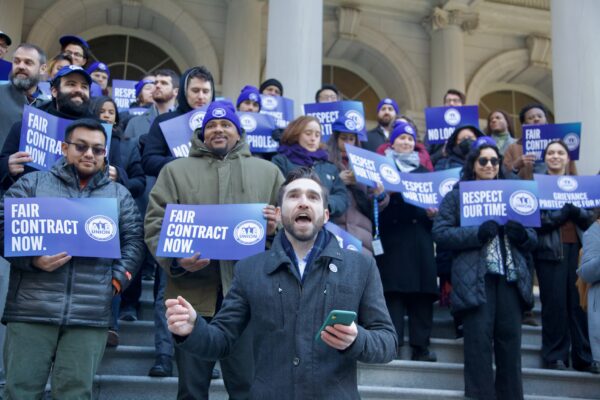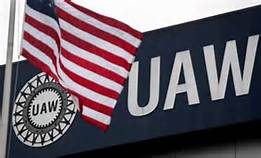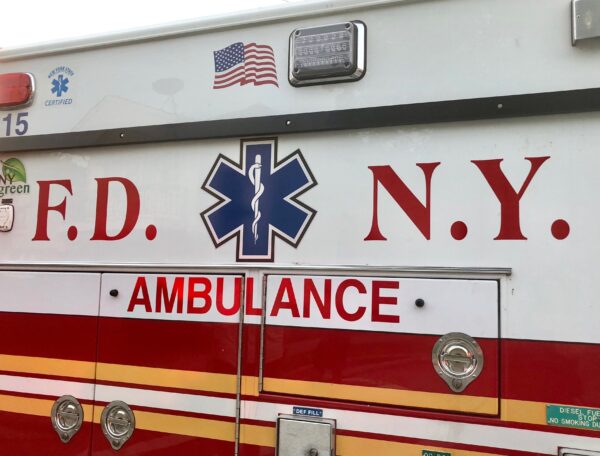March 30, 2013
By Joe Maniscalco
New York, NY – After more than three-long years, the fight to extend paid sick days to New York City working men and women took a giant leap forward on Friday when powerful City Council Speaker Christine Quinn announced that she has decided to support a limited bill – but even those who stood behind the would-be mayor on the steps of City Hall admitted that the struggle to cover everyone is far from over. (Read More/Watch Video)
“I think it would be great if it covered everybody, and all places of businesses,” New York Communities for Change Organizer Jonathan Westin told LaborPress. “Small businesses can afford to give someone who is sick the day off. And that’s what we will continue to fight for.”
Opponents of Councilwoman Gale Brewer’s original bill to extend paid sick days to workers currently forced to clock-in even though they might be seriously ill, have steadfastly maintained that providing such protections to hardworking employees would unduly hurt business owners.
The compromise deal struck this week only applies to businesses with 20 or more employees while excluding manufacturers entirely. In all, that’s about 300,000 New Yorkers who will still have to choose between seeing a doctor or reporting for work when they fall ill.
Public Advocate and mayoral hopeful Bill de Blasio sought to cut through the hoopla surrounding Quinn’s announcement, to suggest that there is no reason why the greatest city in the world cannot expeditiously extend paid sick days to everyone who works full-time.
“I have said from the beginning that there was never any evidence that paid sick days hurts small businesses,” the public advocate said. “There’s no question in my mind, based on what we’ve seen around the country, that paid sick days legislation has not disrupted small businesses. It has made people healthier, it has led to more productive employees because they got well, and it has led to parents being able to take care of their children better. But it has not disrupted small business.”
Working Families Party Co-founder Bill Lipton also dismissed the argument that paid sick days hurts business owners.
“We’ve never seen any economic study with any validity that shows that,’ Lipton said. “In fact, where this has been done, in Connecticut and San Francisco, there’s significant evidence that it reduces employee turnover and has other positive effects.”
Despite his support for the compromise bill which will reportedly extend paid sick days to as many as one million New York City Workers, Lipton stressed that his group is not going to stop pushing “until everyone has this basic measure of economic security.”
“Today, was a huge step forward, but it’s not the end,” Lipton said. “I think the proof will be in the pudding when months from now the mandated IBO [Independent Budget Office] study comes out. If it shows what I hope it will, and expect it will – that there is no economic impact – we hope that the council members will reduce the number [of employees needed to trigger compliance] and deal with the [exclusion] of manufacturing.”
The majority of New York City workers currently toiling without the protection of paid sick days still might not benefit from the new deal with Speaker Quinn until two years from now – if at all.
That's because part of the crafted compromise stipulates that the extension of limited paid sick days will be phased in over time, and only if economic conditions – as measured by the Federal Reserve Bank of New York’s Index of Coincident Economic Indicators – are deemed rosy enough.
“We have to hasten the day when everyone is covered,” de Blasio said. “When I’m mayor, it will be a top priority to pass comprehensive paid sick days legislation that will reach people immediately. I don’t want to wait until late 2014 or even 2015. Maybe, if there’s some economic bad news, some of this bill won’t go into effect. And I certainly don’t want to leave out the 300,000 New Yorkers for whom this deal doesn’t reach. I don’t know how you say to them, ‘We’re giving paid sick days to some, but you don’t get included.’”
According to Westin, the compromise bill – if it ultimately does go into effect – would positively impact virtually all of the fast food, supermarket and car wash workers his grassroots organization represents.
“There’s always more that can be done,” Westin said. “I think every worker should have the right to paid sick days. But this is a big step forward for workers.”
This week's deal has 32BJ President Héctor J. Figueroa thinking nationally.
"This is just the beginning, Figueroa said. "And it's a strong foundation that we can take to the next level."
Political insiders charge that continuing to oppose paid sick leave legislation had become a political liability for Quinn, and that's the only reason why the speaker has now decided to throw her support behind a further watered-down version of the measure. Something the public advocate heartily echoed on Friday.
“If Christine Quinn had had her way, there would not have been a paid sick days bill,” de Blasio said. “It’s clear that for the last three years, Christine Quinn was not listening to everyday New Yorkers – she was listening to the business community. That’s who was calling the tune. It’s obvious that the political pressure got to be too much for her.”
Despite the enthusiastic support of active unions like 32BJ SEIU, 1199 SEIU and RWDSU, the public advocate is dismissing the notion that Quinn has effectively locked up the endorsement of labor.
“I think that anyone who weights their vote or their endorsement is going to think about what happened here, and what it says about the kind of leadership that people exhibit and who’s side are they on,” de Blasio said. “Are they on the side of everyday people, or are they on the side of big business? I think a lot has been revealed in these last months, and that will weigh heavily on the minds of those organizations.”
The public advocate said that he is happy that New York City has finally done something about paid sick days, but lamented other cities like Philadelphia, Portland and San Francisco and Seattle "did more than we did.”



